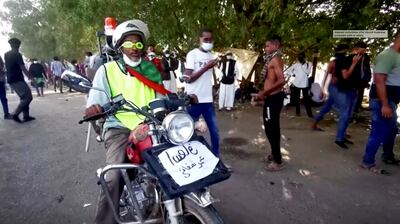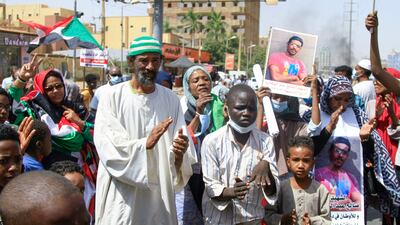Sudanese security forces have removed street barricades placed by pro-democracy protesters in Khartoum’s sister cities of Bahri and Omdurman, foiling their attempt to cripple life in the capital.
Witnesses said that on Sunday, a security contingent made up of troops, police and members of a paramilitary force removed the barricades at lunchtime, about six hours after the protesters had set them up.
The barricades, mostly made of rocks, tyres and tree branches, disrupted the rush-hour traffic heading to Khartoum, forcing many to stay at home.
Some protesters pelted the security forces with rocks as they dismantled the barricades, but there were no major clashes between the two sides or reports of casualties.
Diaaeldeen Khetam, an airport employee from Omdurman, said it took him two hours to get to work on Sunday. “Heavy traffic everywhere. I was late for work, but still lucky to have made it.”
Another Omdurman resident, author Sohanda Abdel Wahab, left her home at 7.30am for Khartoum, but could not reach her destination. “I wanted to return to Omdurman but that was also difficult, so I sat by the Nile and waited until traffic cleared,” she said.

Protesters who erected the barricades did so at the behest of the Resistance Committees, a major pro-democracy group that has led rallies demanding an end to military rule and the restoration of Sudan’s democratic transition, which was derailed by a coup last October.
The committees were seeking to repeat the success of two days of street barricading last week that brought life in the capital to a halt.
While life was significantly disrupted in Bahri and Omdurman on Sunday morning, central Khartoum was packed. Streets were clogged with traffic and almost all stores were open. Shoppers thronged the nearby Al Araby market, where everything from food to electrical appliances and clothes are on sale.
Sudan has been swept by near daily, anti-military protests since last year’s military takeover. Security forces have violently dealt with the rallies, killing at least 90 protesters and injuring another 3,000.
Army chief and coup leader Gen Abdel Fattah Al Burhan has repeatedly called on civilian politicians to reach a consensus on the way forward in the transition to democratic rule before negotiations with the military can begin.
The pro-democracy movement, however, is adamant that it will not to negotiate directly with the military and says the generals are buying time to consolidate their grip on power.
Sudan’s economic woes have significantly worsened since the coup. The country’s main backers have suspended hundreds of millions of dollars’ worth of badly needed aid in response to the generals’ takeover.
Since October, the prices of essential items, such as fuel, wheat-flour and sugar, have soared out of reach of many Sudanese. The Sudanese pound has also sharply depreciated against the US dollar, feeding the surge in prices.
The UN said last week that the number of Sudanese facing acute hunger will more than double, to 18 million, by September this year because of the combined effects of conflict, economic troubles and poor harvests.


